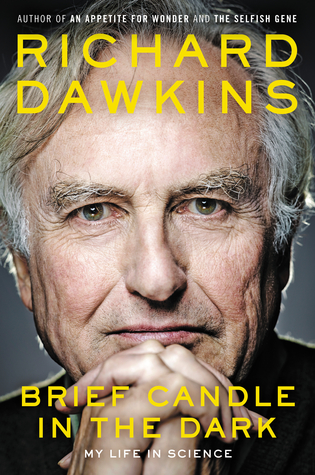 |
Brief Candle in the Dark My Life in Science
Richard Dawkins
Ecco, first US edition, 2015
ISBN: 978-0-06-228843-1 |
It should be initially noted that this is not a traditional autobiography, so readers won’t find a linear timeline of the author’s life and accomplishments. For that more traditional account, the reader should refer to “An Appetite for Wonder”, published in 2013. The current tome should be read as an addendum to his autobiography where you get to learn additional nuances that make this man tick. Here the reader will find a series of anecdotes and experiences that are important for the author, and are logically grouped into chapters. As is always the case with Richard Dawkins, there is much to learn here, but a certain amount of caution should be exercised.
For the novice, Dawkins will most likely come across as forceful and somewhat pedantic, and surprisingly (I imagined his autobiography to be more relaxed and congenial) this book is no exception. Indeed, although the author believes in elitism sensu stricto (the existence of a class of bona fide experts who we should rightfully defer to when appropriate) readers can easily be led to feel that he really believes in elitism in the more vulgar sense, which is to say, that the learned are simply superior to everyone else. It does not help that throughout this book, he lists multiple encounters with royalty, academics, entrepreneurs and other luminaries (i.e. the elite) but has little to say about encounters with “regular folk”. Perhaps he feels that recounting his experiences with commoners is not what the reader is looking for, which is plausible, but it is hard to know if he simply does not find these enlightening. To add insult to injury, readers might get cloyed by an equally large number of elite experiences, such as having both a new genus of fish and an asteroid named after him, or being invited to explore the ocean depths to find giant squid.
At the risk of sounding like a bitter and jealous colleague, I am simply serving as a literary filter. Dawkins is known for being forceful and to many, condescending, with his arguments. Additionally, although he is an able pedagogue (for example, his "Darwinian engineer" concept is very clever; see pg 347), he apparently struggles to understand his audience at a basic level. As an example, he was genuinely shocked that when an interviewer suggested that the general public might not know who Watson and Crick were, going as far as to suggest that no one would question whether they knew of Wordsworth and Coleridge or Gilbert and Sullivan (pg 211). Frustratingly enough, I myself would not be able to tell you who these non-scientific duos were in any detail without googling them first, and I happen to think I am relatively intelligent! I unfortunately fear that Dawkins simply does not get that knowledge and erudition are often a result of the individual's personal, academic and cultural background. Tellingly, Dawkins himself relates an episode with Neil DeGrasse Tyson (yet again, another elite) where he was gently reprimanded precisely for not being attuned with his listeners (pg 261).
In summary, this autobiography has great historical and academic value, and is a rich source of "Dawkinsian" thinking, but might not serve as a great reference for young students looking to find a role model in the sciences. Tread carefully.
